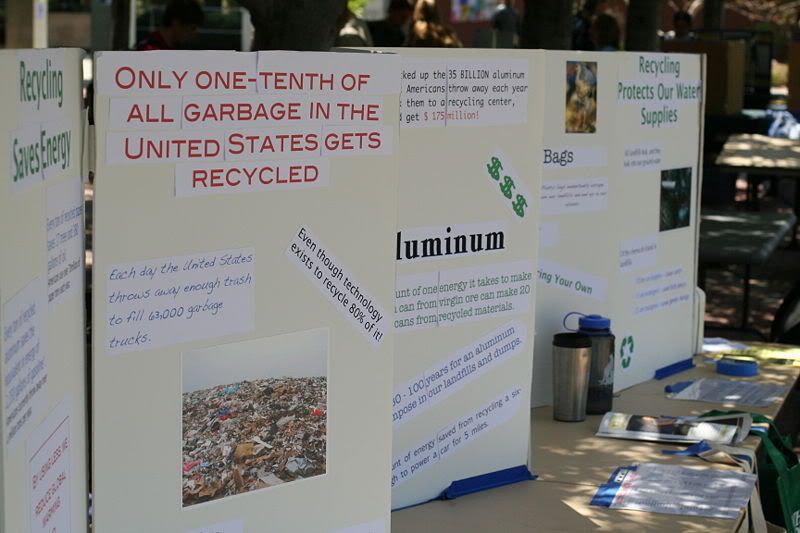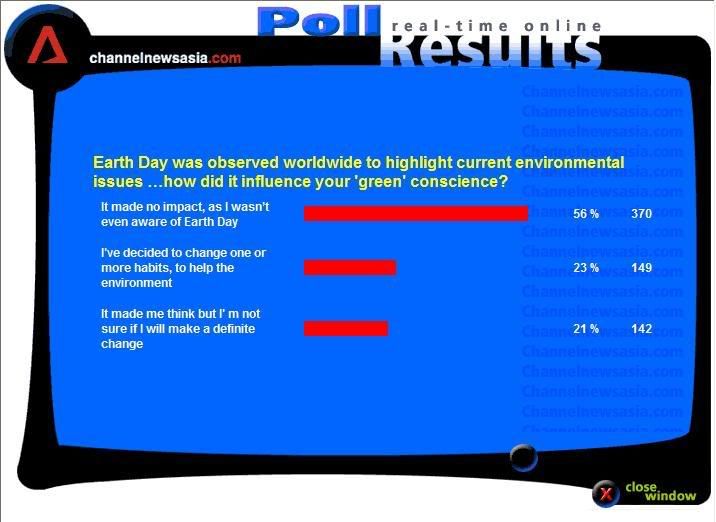Earth Day - Speaking For The Trees
Hello! This is the Environmental & Health Expert's 3rd post, entitled "Earth Day - Speaking for the trees". Recently I went on Channelnewsasia.com and happened to stumble upon this quick poll on "Earth Day". Surprisingly, although Earth Day is observed worldwide in 175 countries annually to highlight current environmental issues, more than half the people who took the poll do not know about Earth Day and its significnace. Therefore this post will be serving as a guide to Earth Day: how it is related to globalisation, its impact on the global community and my thoughts on Earth Day.
Materials: Web Poll on Earth Day, Images of Earth Day Flag and on How Earth Day is Celebrated
Sources:
http://www.aas.com.sg/features/archive/f05022.htm
http://en.wikipedia.org/wiki/Earth_day
http://www.earthday.net/climatechange.aspx
http://www.more4kids.info/392/earth-day-and-your-kids/
http://info.channelnewsasia.com/cgi-bin/poll/cnapoll1to1.cgi?group=cna_poll&pollchoice=View
What is Earth Day?
Earth Day, which falls on 22 April, is observed worldwide to highlight current environmental issues. It is aimed to raise public concern and awareness about the state of the environment, serving as a global day of observance of environmental problems. Earth Day was first held on 22 April 1970 as a response to widespread environmental degradation. The paragraph below shows how Earth Day came into implementation and the reasons behind its formation.
According to Santa Barbara, California Community Environmental Council:
"The story goes that Earth Day was conceived by Senator Gaylord Nelson after a trip he took to Santa Barbara right after that horrific oil spill off our coast in 1969. He was so outraged by what he saw that he went back to Washington and passed a bill designating April 22 as a national day to celebrate the earth."
The very first Earth Day in 1970 was aimed at demostrating strong political support for environmental agenda and received popular response in the United States. Thousands of colleges and universities, as well as numerous primary and secondary schools, and committees in the nation were involved. In fact, 20 million people participated in the Earth Day celebrations in 1970. Due to the overwhelming response received, Earth Day was considered a success and led people to ponder over the state of the environment and what they can do to improve it. As a result, many important laws were passed by the Congress after the 1970 Earth Day, including the Clean Air Act, laws to protect drinking water, wild lands and the ocean. Also, it also lead to the formation of the United States Environmental Protection Agency.

Earth Day flag
Credits: http://en.wikipedia.org/wiki/Earth_day#Earth_Day_1970
A flag was also created for Earth Day to represent its importance and significance, since flags are used symbolically as concrete representations for abstractions. In this case, the flag is designed with a picture of the Earth in the middle to show that the flag represents Earth Day. Also, the Earth is placed in the centre of the flag to show that Earth is the centre of attention. The Earth also symbolises the united efforts of the world to bring the state of the environment to a better level.
How is It Related To Globalisation?
Earth Day is closely related to globalisation as it is an occasion where the global community attempts to make a joint effort in saving the environment and making the world a better and sustainable home for everyone. Globalisation is the increasing global connectivity, integration and interdependence in the economic, technological, cultural, political, and ecological aspects. The ecological aspect examines global environmental challenges that can only be solved through international cooperation, such as climate change, pollution, as well as the spread and development of diseases and medicine. Today, one of the major and most critical environmental challenges the world faces is climate change. In my first post, I mentioned that climate change is a global environmental challenge that requires global attention and all nations to overcome together. Earth Day is one example of how various nations around the world make a joint effort in saving the environment. Earth Day was first started in America in 1970 with only 20 million participants. Later, the success of Earth Day in America triggered off people's concerns about the environment, thus leading to the spreading of this global culture and ideology - Earth Day. Today, Earth Day is celebrated in 175 countries around the world with half a billion people involved in it. We can see a certain form of cultural homogenization where a global culture is being cultivated. Therefore Earth Day is closely related to the cultural and environmental aspects of globalisation.
What is Its Impact?
As mentioned earlier in this post, Earth Day is celebrated in 175 countries around the world today with half a billion participants in total. It is coordinated by the Earth Day Network which is a non governmental organisation aimed at changing the human behaviour and provoking policy change. Indeed, Earth Day places a huge impact in various nations today as they come up with different methods to celebrate this day and at the same time, save the environment.
Activities Conducted Around the World on Earth Day:
- Singapore - Earth Day is renamed Car Free Day and the public is encouraged to refrain from driving on that day and use public transport or cycle.
- Washington State, USA - The Car Free Olympia Challenge takes place and directors from all state agencies and government officials are challenged to be car free that day.
- Manila, The Phillippines - A 50 km bike tour of seven cities around Metro Manila is organised by The Firefly Brigade. This is to encourage the use of environmentally friendly transport.
- Amman, Jordan - Al-Urdon Street which connects East Amman and North Amman is closed for youth to join its Mayor in flying balloons and kites carrying messages against air-pollution.

Artwork by Students from City College, San Diego in celebration of Earth Day 2007
Credits: http://en.wikipedia.org/wiki/Image:Earth_Day_2007_at_City_College_San_Diego.JPG
Earth Day is celebrated in schools today so as to educate students in respecting the Earth at a young age. Students learn to understand the importance of Earth Day as they will be the caretakers of this planet in the future. On Earth Day, students are engaged in meaningful activities which are aimed at allowing students to understand the significance of Earth Day. For example, in the picture above, we can see posters regarding the amount of destruction we are doing to Earth in various aspects. These posters are done by students from City College, San Diego in celebration of Earth Day 2007. Through these activities, students learn about the importance of energy conservation, recycling, respecting nature, saving water and reducing pollution. Working individuals also make it a point to reduce use of electricity or other natural resources on that day, by car pooling, conserving water and electricity as well as recycle their shopping bags.
Thus we can see that everyone can play a part in ensuring that our future generations have a sustainable environment to live in. By doing our part and at the same time, educating them about the importance of saving the environment, we have achieved two of our objectives at the same time. We will be able to save the little resources we are left with and save Mother Earth. Lets do our part as Earthlings: change the human behaviour and provoke policy change!
My Reflections
Credits: http://info.channelnewsasia.com/cgi-bin/poll/cnapoll1to1.cgi?group=cna_poll&pollchoice=View
Take a look the poll results above. The question is "Earth Day was observed worldwide to highlight current environmental issues... how does it influence your green conscience?" 56% of the poll takers mentioned that "it made no impact, as I wasn't even aware of Earth Day", 23% mentioned that "I've decided to change one or more habits, to help the environment" and 21% chose the option "It made me think but I'm not sure if I will make a definite change".
After looking at the poll results, it is upsetting to know that while the global community is trying its best to reduce pollution and combat climate change, most Singaporeans are still consuming large amounts of electricity and creating pollution. It is mentioned earlier that Singapore celebrated Earth Day, ironically 56% of Singaporeans are unaware of such a day. Does this not show the ineffectiveness of the Car Free Day? Moreover, Singapore is famous for its keenness in participating in global campaigns and agreements in combating climate change and reducing pollution. Yet, 78% of Singaporeans are inactive in environmentally friendly practices. With only 1 out of 4 people supporting such campaigns, the success rate of these campaigns are very low. In fact, the amount of environmental damage done by these 3 people will most likely outweigh the help that 1 person is willing to save the environment. Eventually efforts in saving the environment and extending the sustainability of the planet will be futile. So why try when we know fully well that not much results will be yielded from it? If we continue to create damage to the environment at this rate, why make it a point to sign the Kyoto Protocol and why implement the 3 'R's (Reuse, Reduce and Recycle) when we know fully well that these practices are unlikely to gain the support of the people?
In my opinion, if we are really sincere in extending the sustainability of this planet, more has to be done to save the environment. I believe that first, we need to raise public awareness on the consequences of our actions if we fail to save the environment. Propaganda through the various forms of media has to be used so that the public will see the importance of saving the environment. Second, more environmentally friendly practices can be implemented once the general support is gained. In this way the general public can be more involved in saving the environment. Third, such campaigns should only be carried out on a regular basis to gain the support of the people. By organising such campaigns every now and then, we will be exerting pressure on the public. This pressure will eventually force the public to overturn these environmentally campaigns. The initial goal is to save the environment, and thus we need to make sure our actions are aimed at saving the environment, not pressuring the people.
With these 3 points in mind, I'm sure that future environmental practices will be a better success than before. As such, I hope that those post has served as an effective guide to Earth Day and how it is related to globalisation. Till next time then, bye!
Yours,
the Environmental and Health Expert
serene!